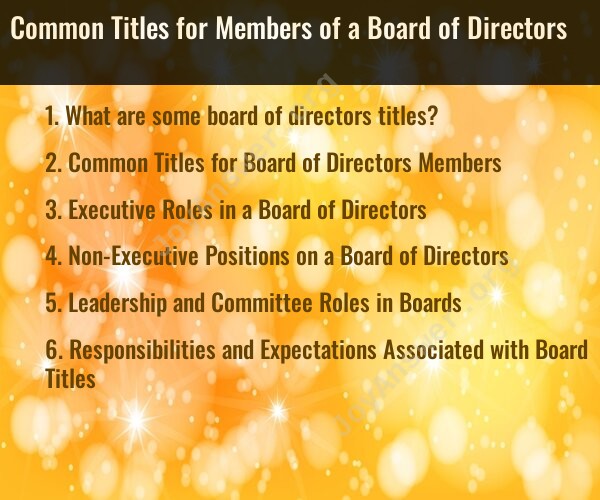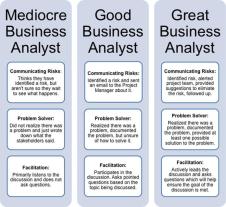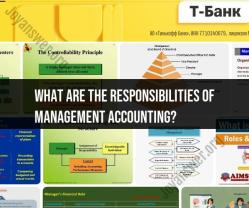What are some board of directors titles?
Members of a board of directors typically hold various titles, which can vary depending on the organization and its specific structure. Here are some common titles associated with board members:
Chairperson or Chair of the Board: The chairperson is the head of the board and presides over board meetings. They play a leadership role in setting the board's agenda and ensuring effective governance.
Vice Chairperson: The vice chairperson assists the chairperson in their duties and may step in to lead meetings in the chairperson's absence.
President or Chief Executive Officer (CEO): In some cases, the organization's CEO may also serve on the board and hold the title of President or CEO. This allows the CEO to provide input and insights to the board.
Lead Independent Director: In organizations where the chairperson is not independent (e.g., in a publicly traded company where the CEO is also the chairperson), a lead independent director may be appointed to provide independent oversight.
Treasurer or Chief Financial Officer (CFO): The treasurer or CFO is responsible for financial matters and may lead the board's financial committee.
Secretary or Corporate Secretary: The secretary is responsible for maintaining board records, taking meeting minutes, and ensuring compliance with corporate governance and legal requirements.
Audit Committee Chair: The chair of the audit committee leads the committee responsible for overseeing the organization's financial reporting, internal controls, and external audit processes.
Nominating and Governance Committee Chair: This committee chair is responsible for nominating new board members, evaluating board performance, and overseeing governance matters.
Compensation Committee Chair: The compensation committee chair leads the committee responsible for setting executive compensation and benefits.
Committee Members: Board members may serve on various committees, such as audit, nominating and governance, compensation, or other specialized committees. These committee members may have specific titles related to their committee roles.
Director: Individual board members are often referred to as "directors." They may also have additional titles or responsibilities based on their roles within the board.
Advisory Board Member: Some organizations have advisory boards that provide advice and expertise but do not have the same level of decision-making authority as the main board of directors. Advisory board members may have titles like "Advisory Board Member" or "Advisory Committee Chair."
Independent Director: In the context of corporate governance, some board members may be designated as "independent directors" to ensure that they do not have significant financial or personal ties to the organization.
Ex Officio Director: Certain individuals may serve on the board by virtue of their position, such as a university president or a government official, and are referred to as "ex officio directors."
Honorary Director: Some organizations appoint individuals as honorary directors to recognize their significant contributions or support. These positions may be symbolic and carry no voting rights.
It's important to note that the specific titles and roles of board members can vary widely, and not all organizations use all of these titles. The titles may also be influenced by the organization's legal structure, industry, and governance guidelines. Additionally, the roles and responsibilities of board members can differ between for-profit and non-profit organizations.
Common Titles for Board of Directors Members
The following are some common titles for board of directors members:
- Chair of the Board: The chair of the board is the highest-ranking member of the board and is responsible for presiding over board meetings and ensuring that the board operates effectively.
- Vice Chair of the Board: The vice chair of the board supports the chair of the board and may step in to lead the board in the chair's absence.
- Secretary of the Board: The secretary of the board is responsible for taking minutes of board meetings and maintaining board records.
- Treasurer of the Board: The treasurer of the board is responsible for overseeing the company's financial performance and reporting to the board on its financial condition.
- Director: Directors are responsible for attending board meetings and participating in the board's decision-making process.
Executive Roles in a Board of Directors
Executive directors are members of the board of directors who are also employed by the company in an executive role. Executive directors typically hold senior management positions, such as CEO, CFO, or COO.
Executive directors are expected to contribute their expertise and knowledge to the board's deliberations. They also have a responsibility to ensure that the company is well-managed and that its performance is satisfactory.
Non-Executive Positions on a Board of Directors
Non-executive directors are members of the board of directors who are not employed by the company in an executive role. Non-executive directors typically have expertise in a particular area, such as finance, law, or marketing.
Non-executive directors are expected to provide independent oversight of the company and to challenge the management team when necessary. They also have a responsibility to protect the interests of shareholders.
Leadership and Committee Roles in Boards
In addition to their basic duties and responsibilities, board members may also be asked to serve in leadership roles or on committees.
Leadership roles on a board of directors may include:
- Lead Director: The lead director is a non-executive director who is responsible for overseeing the work of the board and ensuring that it is functioning effectively.
- Committee Chairs: Committee chairs are responsible for leading the work of board committees. Common board committees include the audit committee, compensation committee, and governance committee.
Responsibilities and Expectations Associated with Board Titles
The specific responsibilities and expectations associated with board titles will vary depending on the company's size, structure, and industry. However, there are some general responsibilities and expectations that apply to all board members.
All board members are expected to:
- Attend board meetings and participate in the board's decision-making process.
- Act in good faith and with due diligence.
- Act in the best interests of the company and its shareholders.
- Comply with all applicable laws and regulations.
- Maintain confidentiality.
Executive directors also have a responsibility to ensure that the company is well-managed and that its performance is satisfactory. Non-executive directors also have a responsibility to provide independent oversight of the company and to challenge the management team when necessary.
Board members should be familiar with the company's bylaws, which will outline their specific responsibilities and expectations.













